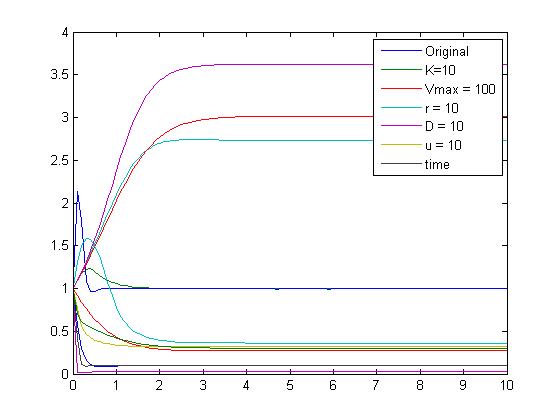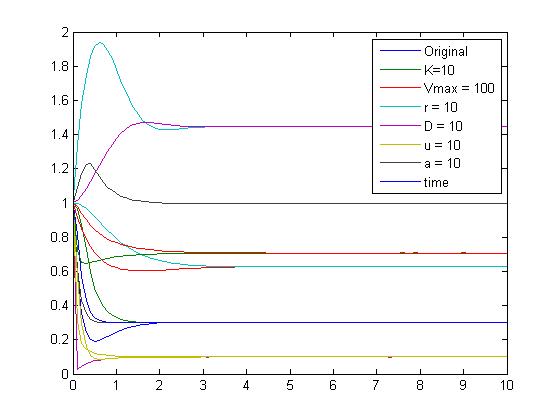Nick Rohacz: Week 5
From OpenWetWare
Jump to navigationJump to search
Instructions
- First, make sure you understand which variables are the state variables (dependent variables that determine the concentrations) and which variables are parameters (e.g., rate constants).
- Simulate this system with different values for the constants and the initial concentrations of nutrients and cells. The initial nutrient level can be =0, but the constants and the initial cell population size need to be positive.
- Can you make any observations about how the system behaves? The matlab models of the enzyme kinetics may be helpful: this system has two state variables, so you’ll need x(1) and x(2), dxdt(1) and dxdt(2) as in the Michaelis‐Menten substrate/product model.
- Adapt the system to a logistic growth model. Simulate this system with different values for the constants and the initial concentrations of nutrients and cells. The initial nutrient level can be =0, but the constants and the initial cell population size need to be positive. Can you make any observations about how the system behaves?
- Suggest some additional adjustments. For example, look at the nutrient dependent growth rate in the Malthus model. Or, think about the waste products the yeast might produce. Are any of them toxic to the yeast? Where might that lead?
Data
- State Variables
- n(t) = concentration of nutrients
- y = concentration of yeast
- Independent Variables
- D = 1/hour = dilution rate
- Vmax = maximum volume
- u = feed concentration
- r = net growth rate
- a = max population parameter, used in logistic model only
- K = rate constant
Figures
- All constants start with value = 1, except volume which starts at 10.
Population figure
Logistic figure
Adujustments
- Some possible adjustments to make to the model are to measure the production of ethanol from the yeast to see if at certain concentrations of ethanol the yeast gets poisoned. This could lead to the death of the yeast cells which would mean there is no product more being made after certain concentrations of ethanol.
Class Assignments
Summer Research
Class Journals
Individual Work
Useful links
Nicholas A. Rohacz 02:14, 14 February 2011 (EST)

